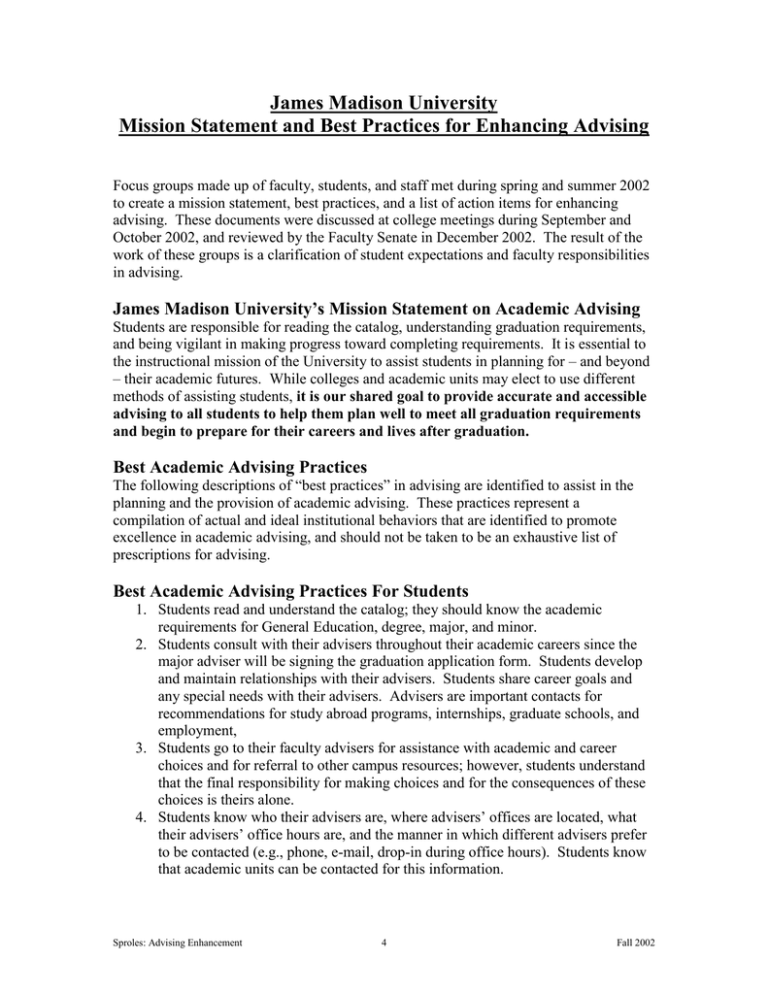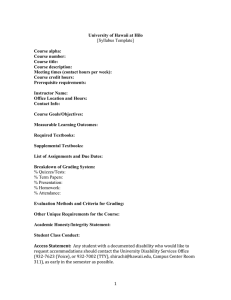James Madison University Mission Statement and Best Practices for Enhancing Advising
advertisement

James Madison University Mission Statement and Best Practices for Enhancing Advising Focus groups made up of faculty, students, and staff met during spring and summer 2002 to create a mission statement, best practices, and a list of action items for enhancing advising. These documents were discussed at college meetings during September and October 2002, and reviewed by the Faculty Senate in December 2002. The result of the work of these groups is a clarification of student expectations and faculty responsibilities in advising. James Madison University’s Mission Statement on Academic Advising Students are responsible for reading the catalog, understanding graduation requirements, and being vigilant in making progress toward completing requirements. It is essential to the instructional mission of the University to assist students in planning for – and beyond – their academic futures. While colleges and academic units may elect to use different methods of assisting students, it is our shared goal to provide accurate and accessible advising to all students to help them plan well to meet all graduation requirements and begin to prepare for their careers and lives after graduation. Best Academic Advising Practices The following descriptions of “best practices” in advising are identified to assist in the planning and the provision of academic advising. These practices represent a compilation of actual and ideal institutional behaviors that are identified to promote excellence in academic advising, and should not be taken to be an exhaustive list of prescriptions for advising. Best Academic Advising Practices For Students 1. Students read and understand the catalog; they should know the academic requirements for General Education, degree, major, and minor. 2. Students consult with their advisers throughout their academic careers since the major adviser will be signing the graduation application form. Students develop and maintain relationships with their advisers. Students share career goals and any special needs with their advisers. Advisers are important contacts for recommendations for study abroad programs, internships, graduate schools, and employment, 3. Students go to their faculty advisers for assistance with academic and career choices and for referral to other campus resources; however, students understand that the final responsibility for making choices and for the consequences of these choices is theirs alone. 4. Students know who their advisers are, where advisers’ offices are located, what their advisers’ office hours are, and the manner in which different advisers prefer to be contacted (e.g., phone, e-mail, drop-in during office hours). Students know that academic units can be contacted for this information. Sproles: Advising Enhancement 4 Fall 2002 5. Students are well prepared when going to their advisers’ office hours or to a prearranged advising conference (e.g., with appropriate GenEd checklist, a tentative schedule of classes for the next semester, a list of questions about fulfilling graduation requirements, a sense of career goals). If a student has questions about registering for classes, s/he seeks advice well before his or her registration. appointment. Students make sure to schedule enough time for their questions to be considered thoroughly, and students make sure that they understand the advice being given. 6. Students understand that advisers have a limited role and responsibility. Students go to appropriate offices for administrative forms and information; students seek approval, when required, from appropriate sources. Best Practices For Faculty Advisers Note: Advising is addressed in the Faculty Handbook in 2 sections: III.E.2.b.(1) Teaching (under “Evaluation Criteria”): Consideration should be given to a faculty member’s commitment to student advising and innovations in teaching as evidenced by development of new course work and teaching methodology. And III.H.4. Student Advising and Office Hours Academic advising is an important responsibility of the faculty. Each full-time student at James Madison University is assigned a faculty adviser when the student declares a major field of study. Although the policy of James Madison University is that the final responsibility for meeting graduation requirements rests entirely with the student, faculty advisers have an obligation to help direct the studies of advisees and answer any questions that they may have. To this end, the adviser is expected to be available to advisees during regular office hours, to stay informed on current policies and procedures, to have knowledge of major programs and career options for students with a major in the academic unit, to be familiar with available student services, and to refer students to the appropriate office or division when necessary. Each faculty member is responsible for maintaining office hours. These hours should be staggered from day to day to accommodate students and other faculty members. A schedule of office hours should be posted and carefully followed in order to avoid confusion and discouragement of students who may desire conferences. Each full-time faculty member shall post a minimum of five regular office hours per week and should be available during other hours by appointment. 1. Faculty advisers help advisees plan, make choices, understand the consequence of choices put information into context and make it meaningful; faculty advisers make sure students understand how their decisions affect their progress toward meeting graduation requirements, and encourage students to make decisions with long term goals in mind. 2. Faculty advisers are sensitive to the wide range of diversity issues (e.g., race, ethnicity, gender, class, sexual orientation, physical and learning disabilities) that might affect an advisee both within the advising relationship and outside of it. Faculty advisers are aware of campus resources that can assist students with these issues and to refer students appropriately. Sproles: Advising Enhancement 4 Fall 2002 3. Faculty are familiar with the current catalog and other advising materials and campus resources and therefore are able to: Give accurate advice about the major, minors, General Education and degree requirements, offer career advice and direct students to Career and Academic Planning and other resources to explore career options. Refer students to appropriate resources in areas unrelated to the major Use appropriate advising forms, obtain information pertinent to advising from the web, and use e-campus to obtain an accurate list of current advisees. 1) Faculty advisers post office hours and are available during those hours. 2) Faculty advisers are efficient in advising (e.g., meet with students in small groups when appropriate; use e-mail distribution lists to contact advisees regarding a change in office hours). 3) Faculty advisers participate in training opportunities for advising as needed. Best Advising Practices For Academic Units [An academic unit is a department, institute, school, program, etc.] 1. Academic units have a plan for handling advising including a mechanism for advising during the summer, advising transfer students, advising non-traditional students, and advising minors and prospective majors. 2. Academic units have someone (e.g., academic unit head, academic unit office, peer advisers) available Monday-Friday 8-5 to answer general advising questions regarding procedures, deadlines, requirements, etc. 3. Academic unit Heads clarify the scope of advisers’ responsibilities within a particular unit (e.g., what a faculty member approves and what needs to be referred elsewhere, what situations preempt office hours (e.g., illness, academic unit and university service commitments). 4. Academic units make sure that advisers’ office hours are available to students. 5. Academic units plan courses to be offered well in advance and make the tentative schedule available to advisers and students for planning purposes. 6. Academic unit Curriculum & Instruction committees have regular communication with advisers in order to share information regarding problems, concerns, and matters such as course rotation. 7. Academic units have a system for assigning majors to advisers, keeping adviser assignments current, reassigning advisees when an adviser is no longer available, letting new majors know who their advisers are, and informing advisers of their new advisees. 8. Academic units that commonly have double majors work with the academic units of those other majors to develop cooperative advising practices. 9. Academic units monitor faculty advising and reward excellent advising through the annual evaluation process. 10. Academic units train new faculty members in degree, major, and General Education requirements as well as provide updates on curricular, academic policy, and procedure changes to all advisers each year (or more frequently if needed), ensure that faculty members are familiar with the full range of campus resources, and make sure faculty members know how to use e-campus to find current advisee assignment. Sproles: Advising Enhancement 4 Fall 2002 11. If Academic units do not choose to have all faculty members advise, then academic units have a mechanism for equitably distributing workload. 12. If appropriate, academic units: Train students to be peer advisers Establish a newsletter/website that includes advising information (e.g., requirements for major, minor and degree; updates on curriculum changes; description of adviser/advisee roles; course rotation; and frequently asked questions) Use e-mail distribution lists to contact students and faculty members regarding deadlines and curriculum changes. Provide orientation for new majors. 13. Academic units assess major advising and include assessment information on advising in the annual report. Best Academic Advising Practices For the University 1. The university recognizes that academic units may develop individualized plans to provide accurate and accessible advising. 2. The university considers advising to be a component of teaching and an essential component of the faculty role. 3. The university trains new faculty members in advising, diversity issues that impact advising, and university resources. 4. The university updates and, when necessary, trains faculty members to advise when a new curriculum is implemented. 5. The university offers faculty development support in advising. 6. The university communicates the faculty’s responsibility in advising through the Faculty Handbook. The university communicates to students what their responsibilities are in the advising process at orientation. Sproles: Advising Enhancement 4 Fall 2002
